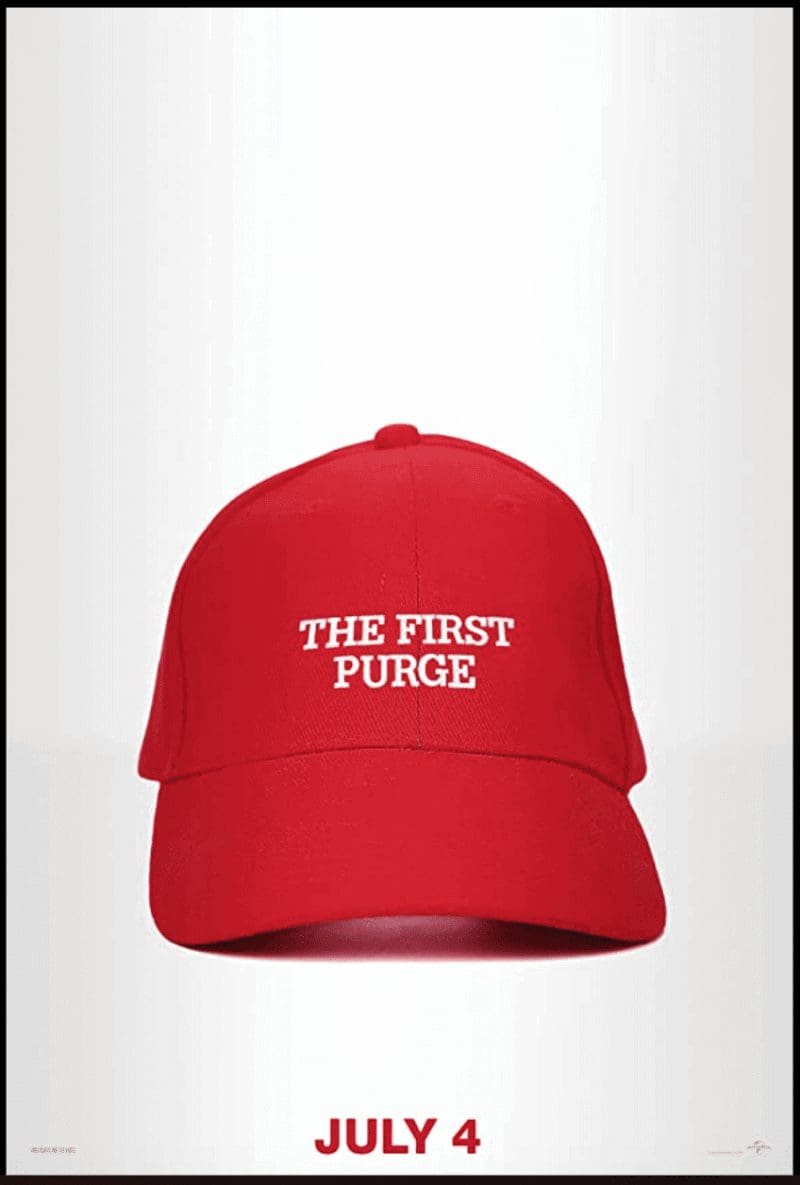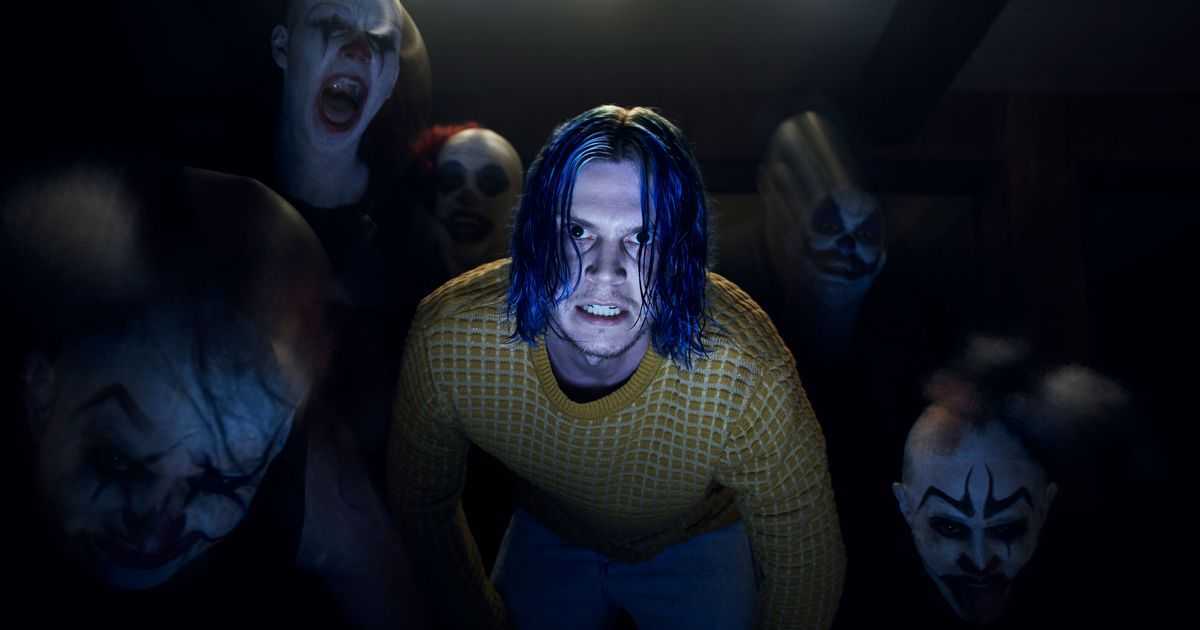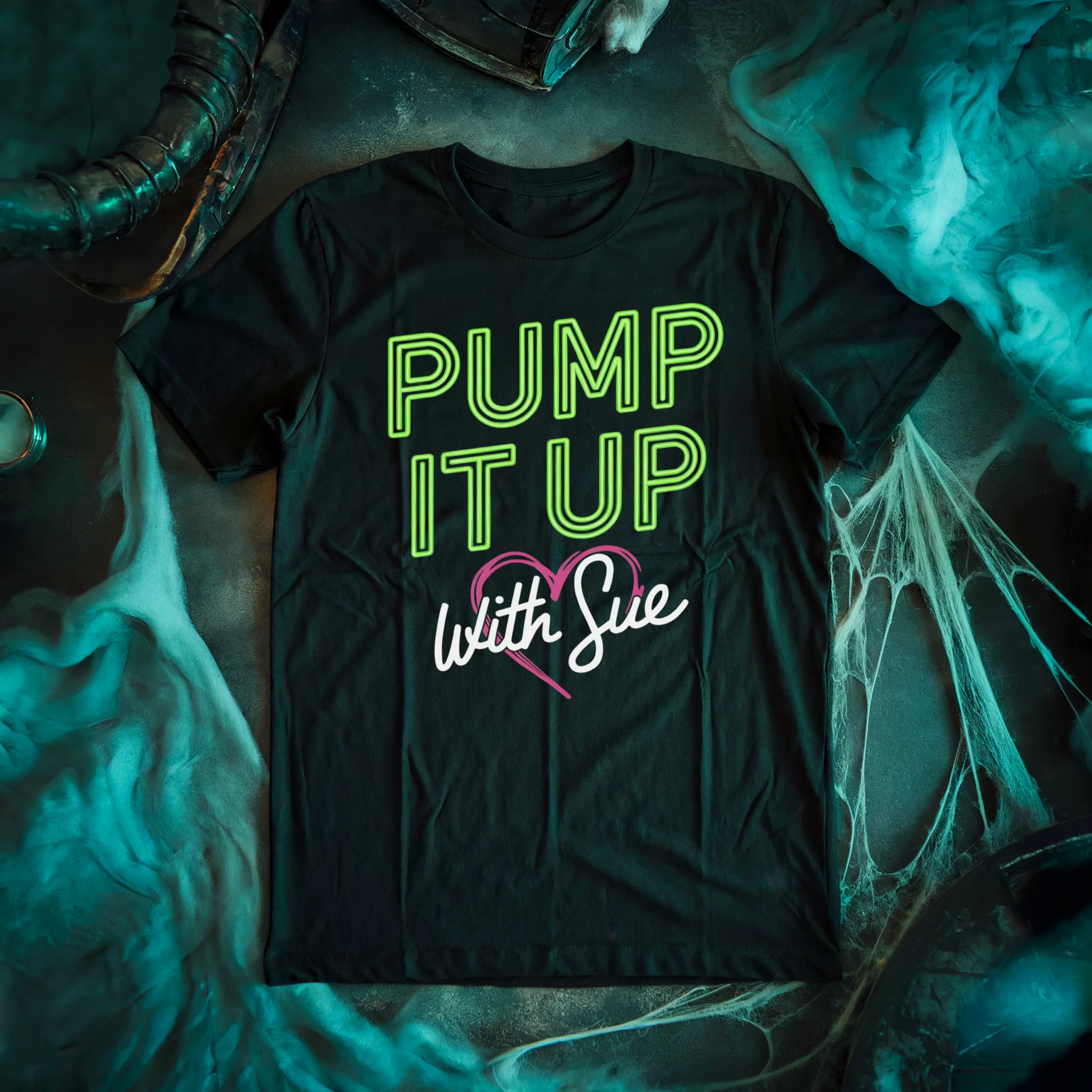Today, the Trump presidency was mercifully put to an end with the inauguration of Joe Biden. The four past years have been excruciatingly long. Every morning we woke up to a new scandal and political pundits tripped over each other to decipher the latest late-night tweet. It was a time of uncertainty and of unprecedented instability. The Trump presidency fostered a political climate that divided the country into two camps, each choosing to live in two very different versions of reality. It was fertile breeding ground for a new brand of horror: dark political satires featuring average Americans navigating the current climate.
Horror cinema has often been influenced by historical events brought about by those in power. Whatever anxieties society was experiencing at that time, whatever disturbing imagery was being spread across the news fueled the imaginations of many filmmakers. Movies like The Texas Chain Saw Massacre and The Last House on the Left were conceived in the aftermath of the blood-soaked Vietnam War. The following decade saw a rise in slashers like the Friday the 13th franchise where drug use and premarital sex were punishable by death, in line with Ronald Reagan’s conservative values. But horror took an even darker turn after 9/11 with the creation of the torture porn subgenre. Scenes in Saw and Hostel mirrored the images coming out of Abu Ghraib and Guantanamo Bay of the “advanced interrogation” techniques employed during George W. Bush’s War on Terror.
Fears were somewhat subsided during the Obama presidency. The illusion of progress put the minds of Americans at ease, but real systemic problems continued to fester below the surface. The end of the Obama era was summed up in Jordan Peele’s social thriller Get Out and his skewering of the white liberals who thought they solved 400 years of racism by voting for a Black man twice (if only they could have voted for him a third time). But fear came bubbling back to the surface the day Donald Trump rode down that escalator. Like Pennywise, Trump used that fear to his advantage.
“[The Trump presidency] was fertile breeding ground for a new brand of horror: dark political satires featuring average Americans navigating the current climate.“
The first “Trump horror,” according to numerous outlets, was the psychological thriller Tilt. It follows a documentary filmmaker (Joseph Cross), inspired to make his next project on American exceptionalism in reaction to Trump’s popularity in the Republican primaries. Joseph spends several hours a day editing and analyzing Trump’s speeches. Exposing himself to Trump’s words on a daily basis slowly infect his mind and Joseph becomes more and more unhinged. Unable to sleep and worried about becoming a father, he wanders the streets of LA at night. His disconnect with reality leads him to murdering tourists and homeless people. His pregnant wife is oblivious to her husband’s changing behavior, until one night she wakes up to see Joseph standing over her with a crazy look in his eye. It’s a slow-burning horror, though there is one jump scare of someone wearing a rubber Trump mask. Tilt was written in the autumn of 2015 observing the energy of the MAGA rallies, but writer/director Kasra Farahani admits he never thought Trump had a chance at winning the presidency. When the film was released in 2017, it became even more relevant. In an interview with NoFilmSchool, Farahani offered his take on the character of Joseph: “Even though he’s outwardly very liberal, I think, inside, he might secretly prefer Trump to win.”
The 2016 Presidential Election generated a lot of anxiety among voters, as Donald Trump climbed his way to the top. Horror filmmakers seized the moment, particularly with The Purge: Election Year. The third installment of the franchise is centered on Senator Charlie Roan (Elizabeth Mitchell) and her campaign to bring the yearly custom of the Purge to an end by running against the tyrannical New Founding Fathers. The male and female presidential candidates in The Purge: Election Year were seen as stand-ins for Hillary Clinton and Donald Trump. It was released in theaters in the summer of 2016, when hopes of Hillary winning remained high. The movie re-entered the news cycle in January 2017, in a bizarre collision between reality and satire. In an interview with the Washington Post, before he was even inaugurated, Trump announced the slogan for his 2020 re-election campaign: “Keep America Great.” But he wasn’t the originator of that phrase, as it was already used as the tagline for The Purge: Election Year, but in a much more ironic sense.
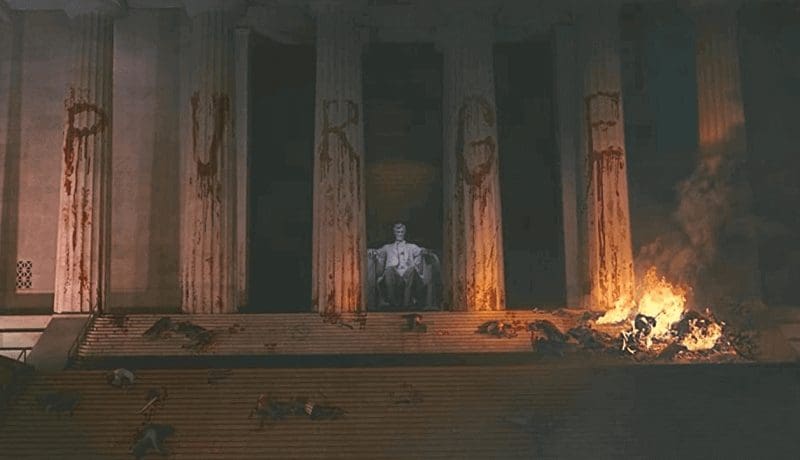
A week before the 2016 election, the Daily Show predicted the worse was yet to come in their Halloween special. The premise of the show imagined a world where Donald Trump was elected president, thanks in part to the scandal over Hillary Clinton’s emails. The episode was set up as a pirate broadcast in a dystopian future, on the eve of the 2020 election. Host Trevor Noah, the last person of color left in America, details how the country has crumbled during the first four years of a Trump presidency, warning whoever is watching that things will get worse if Trump is re-elected. All media outlets except for Fox News have been shut down; John Oliver can be seen being dragged off by the secret police in the middle of Last Week Tonight. Correspondent Desi Lydic has the stand-out segment, reporting in a series of video diaries from the sewers. Under Trump, every woman is forced to wear a bracelet with a number that rates their looks out of ten. After losing weight from starvation, Desi is upgraded from a 7 to an 8, which comes with its own benefits like being allowed to vote and having permission to speak freely around men…if she raises her hand.
Ryan Murphy presented two different reactions to the 2016 election in the seventh season of American Horror Story. The first episode of AHS: Cult takes place on election night, when Donald Trump was declared the winner. A group of liberals watching the news break down in tears and yell at each other for voting for Jill Stein’s Green Party. On the other side of town, internet troll Kai Anderson (Evan Peters) celebrates Trump’s victory by humping his TV and smearing Cheeto dust all over his face in tribute to Trump’s spray tan. Kai uses the fallout of the election as a springboard for his cult. Despite being a Trump supporter, he’s able to recruit people of different races, sexual orientations and political leanings, telling them the one thing that unites all Americans is fear itself.
“[In 2017], Trump announced the slogan for his 2020 re-election campaign: “Keep America Great.” But he wasn’t the originator of that phrase, as it was already used as the tagline for The Purge: Election Year […]“
It seemed like the country was more divided than ever. Thanksgivings with extended family members became even more awkward as racist uncles clashed with leftist cousins visiting home mid-way through their first semester of college. These tense moments at the dinner table were perfectly replicated in the dark comedy The Oath. In the movie, Americans are encouraged to take an oath of loyalty to the President in exchange for certain benefits. Chris (writer/director Ike Barinholtz) fiercely opposes this policy, but promises his wife (Tiffany Haddish) to put his politics aside while hosting his family for Thanksgiving. However, the conversation is impossible to avoid.
Like many Americans over the past five years, Chris is constantly watching the news and looking at news alerts on his phone, addicted to the outrage. In the background, protests against the oath are breaking out all over the country, activist leaders are disappearing from their homes and protestors are shot with live ammo. Chris is disgusted to find out most of his family has already signed the oath and refuses to compromise his opinions for the sake of having a civilized meal. But things get much worse when he’s paid a visit by two government agents, who received a tip that Chris is obstructing a citizen’s right to sign the oath. The situation escalates quickly and Chris’ unwillingness to cooperate jeopardizes the safety of his family.
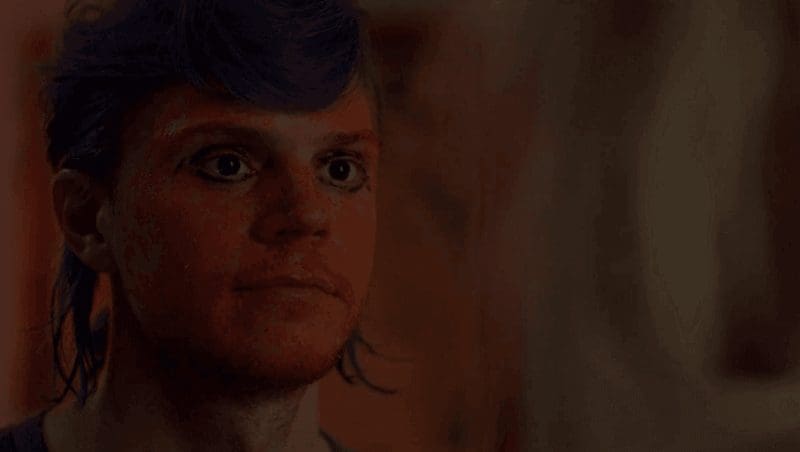
The Hunt, Blumhouse’s reimagining of The Most Dangerous Game, floats the question: what if the alt-right conspiracy theorists were right? What if there was a secret cabal of liberal elites who hunted “deplorables” (a term coined by Hillary Clinton to describe Trump’s toxic fan base) for sport? What if refugees were really crisis actors? Although The Hunt doesn’t explicitly refer to Trump by name (instead calling him “our ratfucker-in-chief”), it’s blatantly obvious that it’s about him by pitting his supporters against his haters. Rumors about the subject of the film caught Trump’s attention, prompting the President to warn his Twitter followers that the movie was made “in order to inflame and cause chaos,” and that the filmmakers are the “the true Racists, and are very bad for our Country.” In any other genre of cinema, this would be a kiss of death, but for horror fans, Trump’s condemnation intrigued them even more.
Trump’s regressive rhetoric has brought racial tensions and gender politics to the forefront of genre cinema. The events of Charlottesville proved that Trump supporters have such a hard-on for the Confederacy, they were willing to fight and kill to save a statue of General Robert E. Lee. This concept is pushed further in Antebellum by depicting (SPOILER) a group of alt-righters so desperate to bring back slavery that they kidnap dozens of black people so they can cosplay as Confederate soldiers and play make-believe on a plantation.
“Trump’s regressive rhetoric has brought racial tensions and gender politics to the forefront of genre cinema.”
Since day one of his campaign, Trump designated Mexicans, specifically undocumented immigrants, as Enemy Number One. Gigi Saul Guerrero’s Culture Shock, released on July 4th through Hulu’s Into the Dark anthology series, shows the real life horrors of crossing the US border in search of a better life, having to deal with predatory coyotes and the Mexican cartel. But once our protagonist Marisol (Martha Higareda) finally crosses into America, life is almost too perfect there. She discovers she’s actually stuck in a simulation as part of a government program to imprison Mexican refugees without their knowing, a program Trump would have likely signed off on in a heartbeat.
It’s no coincidence that #MeToo Movement emerged shortly after Trump won the presidency, leading to a renaissance of the rape-revenge subgenre. People were understandably mad that a candidate who was caught openly bragging about grabbing women “by the pussy” didn’t lose any support. Such actions needed brutal consequences, but only revenge fantasies could provide that satisfaction. Unlike the grindhouse grit of their male counterparts, recent films directed by women like Revenge, M.F.A. and Promising Young Woman have an authentic representation of sexual assault, including society’s treatment of survivors. Seeing our wronged heroines deliver unholy retribution onto their perpetrators gives a more cathartic feeling than the knots left in your stomach after a viewing of I Spit On Your Grave or Irréversible. The issues explored within are by no means new— they’ve existed since the dawn of time. But these films were very necessary at a time when a major facilitator of rape culture was able to reach the highest office in America, despite having accusations from roughly two dozen women leveled against him.
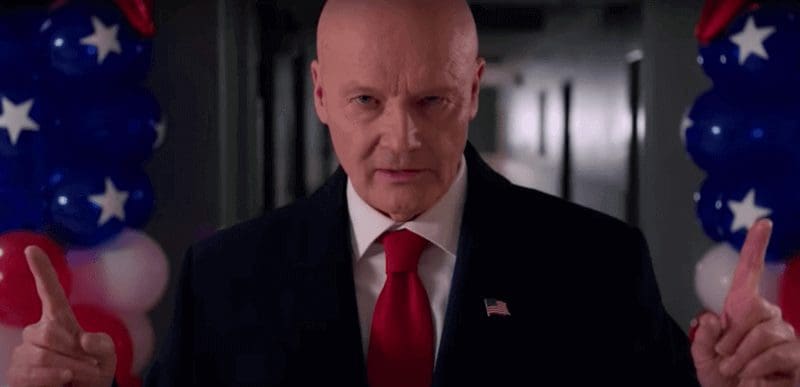
Scream queen Barbara Crampton put it perfectly, tweeting in reaction to Trump supporters storming the Capitol building two weeks ago: “Donald Trump is the lead in the worst horror movie I’ve ever seen. One in which he stars, produced and directed.” As a Canadian, I’m writing from the outside looking in, so I can only imagine how difficult this has been for our American readers. As a journalist, reporting American news powerlessly from the sidelines was like watching an off-the-rails dystopian reality TV show. And this final season has really pushed the envelope. But Canadians aren’t safe from Trump’s influence. It was surreal to see Trump 2020 banners and QAnon flags waving in the streets of Montreal for an anti-mask rally this past summer. Plus, we have our own hate groups to worry about. Canadians often feel a sense of superiority watching events South of the border, but our government is far from perfect. Just look at Blood Quantum, indicative of Justin Trudeau’s failed reconciliation with our country’s First Nation communities.
Hollywood and the entertainment industry tend to lean more on the left, but Democrats walk away looking just as bad in many of these titles. They get into petty arguments and spend more time whining than actively fixing the problem. Sarah Paulson’s portrayal of Ally Mayfair-Richards in AHS: Cult is a prime example, blaming her declining mental health on Trump winning the election. I haven’t heard of any pro-Trump horror films, unless you count Dinesh D’Souza’s horrendous documentaries, but nothing compares to the horror movie that lives in the minds of Trump’s most loyal followers: the conspiracy that Democrats are a secret society of Satanic sex traffickers who abuse and cannibalize children to feed off their youth, and Trump is the only one who can stop them (ignoring his friendship with billionaire pedophile Jeffrey Epstein).
“Donald Trump is the lead in the worst horror movie I’ve ever seen. One in which he stars, produced and directed.” – Barbara Crampton
Artists always have to make the tough decision between addressing urgent issues or creating something that will be cultural significant years after the fact. Horror directors of the past hid their political messages in allegories of monsters, whereas today, subtlety is useless when dealing with loudmouth like Trump. The films risk irrelevance once the following administration takes power, but they’ll become snapshots of historical moments America and the rest of the world won’t soon forget. Looking forward, who knows what will happen in the next four years? Will it be an age of utter dullness? Or will tensions between both sides continue to escalate? Will horror cinema evolve into an even more frightening form? Who knows. Maybe no one will be safe in Joe Biden’s America.
For more timely film analysis, follow us on Twitter, Instagram, Reddit, and the Horror Fiends of Nightmare on Film Street Facebook! And for all the best horror content online, stay tuned to Nightmare on Film Street.
